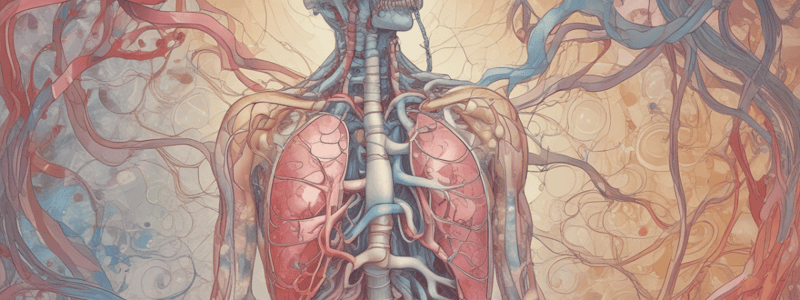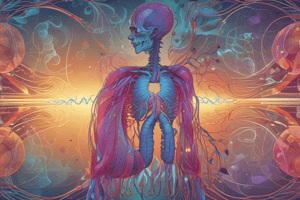Podcast
Questions and Answers
What percentage of oxygen is transported from the lungs to the tissues in reversible chemical combination with hemoglobin?
What percentage of oxygen is transported from the lungs to the tissues in reversible chemical combination with hemoglobin?
- 97% (correct)
- 90%
- 95%
- 99%
What is the approximate PO2 of venous blood returning from the peripheral tissues?
What is the approximate PO2 of venous blood returning from the peripheral tissues?
- 80 mm Hg
- 60 mm Hg
- 40 mm Hg (correct)
- 50 mm Hg
In what state is the remaining 3% of oxygen transported in the blood?
In what state is the remaining 3% of oxygen transported in the blood?
- In the white blood cells
- In the red blood cells
- Bound to hemoglobin
- Dissolved in plasma (correct)
What is the approximate oxygen saturation of systemic arterial blood?
What is the approximate oxygen saturation of systemic arterial blood?
What is the primary way oxygen is transported from the lungs to the peripheral tissue capillaries?
What is the primary way oxygen is transported from the lungs to the peripheral tissue capillaries?
What is the result of oxygen reacting with foodstuffs in the body's tissue cells?
What is the result of oxygen reacting with foodstuffs in the body's tissue cells?
What is the purpose of the oxygen-hemoglobin dissociation curve?
What is the purpose of the oxygen-hemoglobin dissociation curve?
How many times more oxygen can be transported by hemoglobin compared to dissolved oxygen in the blood?
How many times more oxygen can be transported by hemoglobin compared to dissolved oxygen in the blood?
What is the primary factor that determines the rate of gas diffusion through the respiratory membrane?
What is the primary factor that determines the rate of gas diffusion through the respiratory membrane?
What is the primary mechanism by which sympathetic stimulation affects the bronchioles?
What is the primary mechanism by which sympathetic stimulation affects the bronchioles?
What is the effect of parasympathetic fibers on the bronchioles?
What is the effect of parasympathetic fibers on the bronchioles?
What is the approximate time it takes to remove one half of the excess gas in the alveoli at a rate of ventilation that is twice normal?
What is the approximate time it takes to remove one half of the excess gas in the alveoli at a rate of ventilation that is twice normal?
What is the primary cause of airway obstruction in allergic asthma?
What is the primary cause of airway obstruction in allergic asthma?
What is the normal rate of alveolar ventilation in liters per minute?
What is the normal rate of alveolar ventilation in liters per minute?
What is the process by which respiratory gases move among one another?
What is the process by which respiratory gases move among one another?
At which point on the graph does the normal operating point for oxygen concentration and partial pressure in the alveoli occur?
At which point on the graph does the normal operating point for oxygen concentration and partial pressure in the alveoli occur?
What is the rate of oxygen absorption from the alveoli at point A on the graph?
What is the rate of oxygen absorption from the alveoli at point A on the graph?
What is the primary factor that determines the rate of diffusion of a gas?
What is the primary factor that determines the rate of diffusion of a gas?
What is the direction of net diffusion of gases when there is a pressure difference?
What is the direction of net diffusion of gases when there is a pressure difference?
What is the rate of carbon dioxide excretion from the blood at point A on the graph?
What is the rate of carbon dioxide excretion from the blood at point A on the graph?
What is the approximate composition of air in terms of nitrogen and oxygen?
What is the approximate composition of air in terms of nitrogen and oxygen?
What is the effect of increasing alveolar ventilation on the alveolar PO2 at a rate of oxygen absorption of 1000 ml/min?
What is the effect of increasing alveolar ventilation on the alveolar PO2 at a rate of oxygen absorption of 1000 ml/min?
What is the effect of parasympathetic stimulation on the condition of Asthma?
What is the effect of parasympathetic stimulation on the condition of Asthma?
What is the effect of decreasing alveolar ventilation on the alveolar PCO2 at a rate of carbon dioxide excretion of 800 ml/min?
What is the effect of decreasing alveolar ventilation on the alveolar PCO2 at a rate of carbon dioxide excretion of 800 ml/min?
What is the primary function of the respiratory membrane?
What is the primary function of the respiratory membrane?
What is the term used to describe the ratio of alveolar ventilation to alveolar blood flow?
What is the term used to describe the ratio of alveolar ventilation to alveolar blood flow?
What is a characteristic of the alveolar walls?
What is a characteristic of the alveolar walls?
What is the arrangement of capillaries in the alveolar walls?
What is the arrangement of capillaries in the alveolar walls?
What is the result of a mismatch between ventilation and perfusion in the lungs?
What is the result of a mismatch between ventilation and perfusion in the lungs?
What is the composition of a respiratory unit?
What is the composition of a respiratory unit?
What is the consequence of having zero ventilation but normal perfusion?
What is the consequence of having zero ventilation but normal perfusion?
What is the primary driving force behind oxygen diffusion from the alveoli into the pulmonary capillary blood?
What is the primary driving force behind oxygen diffusion from the alveoli into the pulmonary capillary blood?
What is the net result of oxygen diffusion in the tissues of the body?
What is the net result of oxygen diffusion in the tissues of the body?
What is the condition in which there is no perfusion but ventilation is normal?
What is the condition in which there is no perfusion but ventilation is normal?
What is the direction of oxygen diffusion in the pulmonary capillary blood?
What is the direction of oxygen diffusion in the pulmonary capillary blood?
What is the consequence of 'venous admixture' on the PO2 in the pulmonary capillary blood?
What is the consequence of 'venous admixture' on the PO2 in the pulmonary capillary blood?
Flashcards are hidden until you start studying
Study Notes
Oxygen and Carbon Dioxide Transport
- 97% of oxygen is transported from lungs to tissues in reversible chemical combination with hemoglobin
- 3% of oxygen is transported in the dissolved state in water of plasma and blood cells
- Oxygen-hemoglobin dissociation curve shows percentage of hemoglobin bound with oxygen
Oxygen-Hemoglobin Dissociation Curve
- Blood leaving lungs has a PO2 of 95 mm Hg and oxygen saturation of 97%
- Venous blood returning from peripheral tissues has a PO2 of 40 mm Hg and oxygen saturation of 75%
Carbon Dioxide Transport
- Carbon dioxide is transported from tissue cells to lungs in the blood
- 70% of CO2 is transported in the form of bicarbonate ions in the plasma
- 23% of CO2 is transported in the form of carbaminohemoglobin in the red blood cells
- 7% of CO2 is transported in the dissolved state in the water of the plasma and blood cells
Control of Bronchiolar Musculature
- Sympathetic stimulation causes dilation of the bronchioles
- Parasympathetic stimulation causes constriction of the bronchioles
- Local substances secreted by the lungs, such as histamine and slow reactive substance of anaphylaxis, can cause airway obstruction
Pulmonary Capillary Dynamics
- Pressure difference causes net diffusion of gases through fluids
- The rate of diffusion of each gas is directly proportional to the pressure caused by that gas alone
Physical Principles of Gas Exchange
- Diffusion of oxygen occurs from the alveoli into the pulmonary blood
- Diffusion of carbon dioxide occurs in the opposite direction
- The air has an approximate composition of 79% nitrogen and 21% oxygen
Factors Affecting the Rate of Gas Diffusion
- Thickness of the respiratory membrane
- Surface area of the respiratory membrane
- Pressure difference of the gas between the two sides of the membrane
- Diffusion coefficient of the gas in the membrane
Oxygen Concentration and Partial Pressure in the Alveoli
- Alveolar ventilation affects the oxygen concentration and partial pressure in the alveoli
- Normal alveolar ventilation rate is near 5 L/min
CO2 Concentration and Partial Pressure in the Alveoli
- Alveolar ventilation affects the carbon dioxide concentration and partial pressure in the alveoli
- Normal alveolar ventilation rate is near 5 L/min
Respiratory Membrane
- The alveolar walls are extremely thin, and capillaries are arranged as an interconnecting network
- Gas exchange between the alveolar air and the pulmonary blood occurs through the respiratory membrane
Ventilation-Perfusion Ratio
- The ratio of alveolar ventilation to alveolar blood flow is called the ventilation-perfusion ratio
- This ratio is expressed as VA/Q, where VA is alveolar ventilation and Q is blood flow
- Normally, the ratio is near 1, but it can vary depending on the area of the lung
Diffusion of Oxygen from the Alveoli to the Pulmonary Capillary Blood
- Oxygen diffuses from the alveoli into the pulmonary capillary blood because the oxygen partial pressure in the alveoli is greater than the oxygen partial pressure in the pulmonary capillary blood
- In the other tissues of the body, oxygen diffuses from the capillary blood into the surrounding cells because the oxygen partial pressure in the capillary blood is greater than the oxygen partial pressure in the tissues
Studying That Suits You
Use AI to generate personalized quizzes and flashcards to suit your learning preferences.




